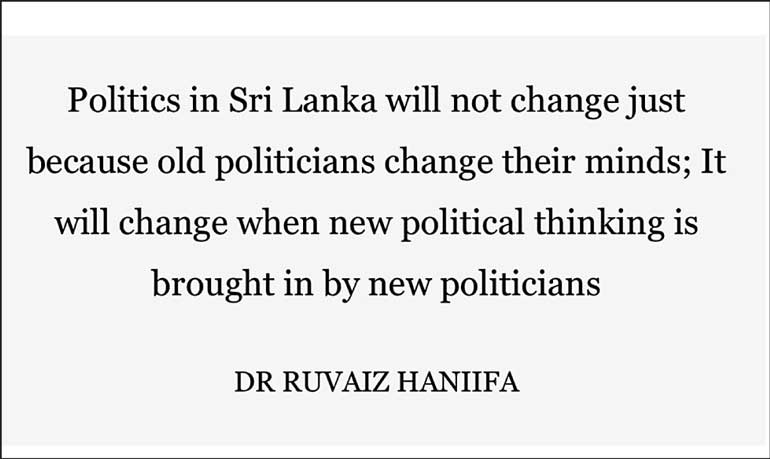Thursday Feb 19, 2026
Thursday Feb 19, 2026
Tuesday, 19 March 2024 00:10 - - {{hitsCtrl.values.hits}}

 I read with great appreciation the Editorial titled “Sri Lanka’s political discourse and ageism” appearing in the Weekend FT of 16 March 2024 (https://www.ft.lk/ft_view__editorial/Sri-Lanka-s-political-discourse-and-ageism/58-759554).
I read with great appreciation the Editorial titled “Sri Lanka’s political discourse and ageism” appearing in the Weekend FT of 16 March 2024 (https://www.ft.lk/ft_view__editorial/Sri-Lanka-s-political-discourse-and-ageism/58-759554).
I would like to make the following comments based on your Editorial.
I am in total agreement of your last sentence where you prophetically warn of the dangers of ageism.
I had made a comment two years ago (attached herewith) on similar lines.
In this comment I specifically focused on ‘old’ politicians (not by age but by duration of involvement in politics) and their continued adherence to ‘old’ political ideas (once again not due to age but due to outdated political economic and other ideas and not changing them to benefit the citizens of Sri Lanka).
The new politics and new political thinking which I refer to in my comments should include politicians even of chronologically ‘old’ age provided their ideas are not set in stone as to ensure continuation of the status quo or to put it more colloquially ‘to continue the proverbial good old days’. The chronologically ‘old’ politicians must not do this. If s/he is unwilling or unable to adopt or change s/he must gracefully impart their wisdom on a new generation of politicians (regardless of age) and move on to better pastures for themselves and wider society.
The scenario where the chronologically old are involved in activities is not confined only to politics. But since politics is a most ‘visible’ profession (for lack of a better word) the effects of action in old age (good, bad and ugly) are publicly manifested through politics.
The fields of business, science, medicine, engineering, and even technology have their fair share of chronically older individuals who are making impactful contributions (as opposed to have made impactful contributions).
As such, collectively categorising all chronologically old individuals as ineffective, inefficient and a hindrance to progress, is what practically amounts what today’s society terms ‘ageism’.
Perhaps Confucius said it best about the chronologically old when he said, “Old age, believe me, is a good and pleasant thing. It is true you are gently shouldered off the stage, but then you are given such a comfortable front stall as a spectator.”
The choice of remaining on stage and performing to meet the expectations of current generations or taking a comfortable front row seat and enjoy (or not) the performance is entirely up to the person. But in politics in Sri Lanka going by past and current practices, politicians in particular tend to become part of the stage whether the voter likes it or not. As such it is the voter in Sri Lanka who must ultimately decide whom they want as their political representatives regardless of age, sex, ethnicity religion, etc.
The governance system in Sri Lanka must do all it can to enable the voter to exercise this democratic right.
Dr. Ruvaiz Haniffa
Specialist family physician, past President Sri Lanka Medical Association